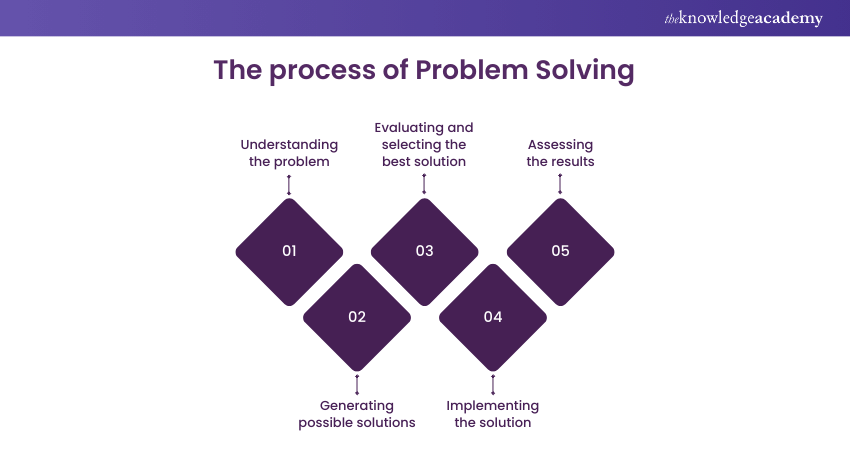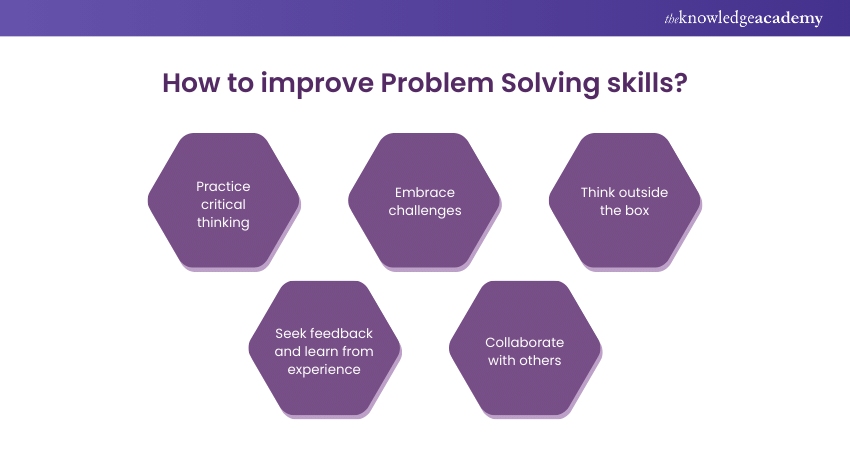We may not have the course you’re looking for. If you enquire or give us a call on +852 2592 5349 and speak to our training experts, we may still be able to help with your training requirements.
Training Outcomes Within Your Budget!
We ensure quality, budget-alignment, and timely delivery by our expert instructors.

Every day, we encounter various challenges and issues that require effective Problem Solving skills. Whether overcoming personal difficulties or handling complex issues in the workplace, finding a solutions to problems plays an essential role in achieving success. Thus, it is crucial to learn ”What is Problem Solving?”
It is a cognitive process of finding, evaluating, and solving challenges. According to Statista, more than 50 per cent of IT Managers preferred candidates with effective Problem Solving skills. If you want to succeed in your workplace, it is important to learn about this concept and thrive in your workplace, this blog is for you. In this blog, you will learn What is Problem Solving , its process, key skills and strategies, and tools and techniques to do so.
Table of contents
1) What is Problem Solving definition?
2) The process of Problem Solving
3) Key skills for effective Problem Solving
4) Strategies for enhancing Problem Solving abilities
5) Problem Solving tools and techniques
6) Conclusion
What is Problem Solving definition?
Problem Solving refers to the cognitive process of identifying, analysing, and resolving a challenge or obstacle. It involves using logical reasoning, critical thinking, and creativity to find effective solutions. It requires an in-depth analysis to solve problems in many situations, whether simple everyday problems or complex issues.

The process of Problem Solving
Now that you know What is Problem Solving, it is time to learn about its process. Effective Problem Solving typically involves several steps that help in approaching and resolving challenges. These steps provide a structured framework to tackle problems efficiently. Let's explore each step in detail:

Understanding the problem
The first step in Problem Solving is gaining a clear understanding of the issue at hand. Take the time to thoroughly analyse the problem and gather relevant information. Ask yourself questions like:
1) What is the nature of the problem?
2) What are the factors contributing to the problem?
3) What are the desired outcomes?
4) Are there any constraints or limitations to consider?
By gaining a comprehensive understanding of the problem, you lay a solid foundation for finding an effective solution.
Generating possible solutions
Once you have a clear grasp of the problem, it's time to brainstorm potential solutions. Encourage creativity and think outside the box. Consider all possible options without judgment or criticism. The goal at this stage is to generate a variety of ideas and alternatives.
Evaluating and selecting the best solution
After generating a list of possible solutions, it's important to evaluate each option based on its feasibility, effectiveness, and alignment with the desired outcome. Consider the advantages and disadvantages of each and every solution. Assess its practicality and the resources required for implementation.
Additionally, take into account the potential risks and benefits associated with each solution. Consider any potential consequences or impacts on other aspects. Based on this evaluation, select the solution that appears most viable and promising.
Implementing the solution
Once you have chosen the best solution, it's time to put it into action. Develop a detailed plan outlining the necessary steps and allocate the required resources. Determine responsibilities and deadlines to ensure a smooth implementation process.
During implementation, monitor progress and make any necessary adjustments or adaptations. Stay proactive and address any challenges or obstacles that may arise along the way. Effective communication and collaboration with others involved in the process can greatly contribute to successful implementation.
Assessing the results
After implementing the solution, it's essential to assess the results. Evaluate whether the problem has been properly resolved or if further adjustments are required. Analyse the outcomes and compare them against the desired goals and expectations.
Consider whether the chosen solution has brought about the intended benefits and if any unexpected consequences have emerged. Reflect on the overall effectiveness of the Problem Solving process and identify any lessons learned for future reference.
Remember, Problem Solving is an iterative process, and it's not uncommon to revisit and refine solutions based on ongoing evaluation and feedback. Embrace a continuous improvement mindset and be open to seeking alternative approaches if necessary.
By following this Problem Solving process, you can approach challenges systematically and increase your chances of finding effective solutions. Remember that practice and experience play a vital role in honing your skills.
Master the art of solving problems and become a catalyst for innovation and success with our Problem Solving Training – sign up now!
Key skills for effective Problem Solving
What one must do to become an effective problem solver is to develop key skills that enhance your Problem Solving abilities. The skills give you the ability to tackle challenges with a strategic mind and find the needed solutions. Below is a dive into the most important of them:
Critical thinking
Critical thinking is a skill that includes the objective analysis of information, considering different viewpoints, and being able to arrive at a sensible judgment. This helps you to assess problems with the right accuracy in judgment and also find suitable solutions.
Creativity
It means that creativity is the ability of a person to think outside the box and come up with innovative solutions. It includes pressing the mind toward new possibilities and viewing the problem in different ways.
Analytical skills
In this ability, there is the aspect of breaking down a problem into subunits that helps in identifying the patterns, relationships, and causes within the problem.
Decision-making
Sound skills in decision making call for the assessment of the pros and cons of all solutions provided and thus choosing the best alternative. Risks must always be considered with the benefits any alternative might bring.
Strategies for enhancing Problem Solving abilities
In order to improve your Problem Solving skills and become a more effective and efficient problem-solver, consider implementing the following strategies:

Practice critical thinking
Engage yourself in activities which require critical thinking, including solving puzzles, complex discussion, challenging all assumptions. This will increase your ability to enhance sharpening of your analytical skills and let you think critically at a time when problems are in your way.
Seek feedback and learn from experience
Seek responses from your mentors, course peers, and Problem Solving experts. From the successes and failures, reflect on the reasons for the occurrences over previous experiences and point out what could be improved. Treat the opportunity of Problem Solving as one of the chances that shall be given to you to grow and develop each time you make it through a problem.
Embrace challenges
You can redesign your problematic issues and take every challenge coming across as an opportunity for growth. Hence, it paves the way for the ability of resilience and strengthens your Problem Solving abilities.
Collaborate with others
In Problem Solving, collaboration is embraced by pooling different perspectives and ideas. Work with others in activities that involve groups to discuss issues and seek input from others, listening actively to various viewpoints. Working collaboratively with others helps expand your knowledge of various ways of Problem Solving and encourages innovation.
Think outside the box
Encourage creative thinking by exploring unconventional ideas and solutions. Challenge every assumption and all its related alternatives. Shift to this kind of mindset, and it can drive innovative Problem Solving strategies, letting you uncover newer ways to solve age-old complex problems.
Problem Solving tools and techniques
When faced with complex problems, utilising specific tools and techniques can help facilitate the solving process and lead to more effective solutions. Here are some commonly used Problem Solving tools and techniques:
Root cause analysis
Root cause analysis is a methodology used to detect the underlying causes of a problem. It involves investigating the problem's symptoms and tracing them back to their fundamental causes. By addressing the root causes, Problem Solvers can prevent the issue from recurring.
Strengths, Weaknesses, Opportunities, Threats (SWOT) analysis
SWOT analysis is a planning tool that strategically helps measure the weaknesses and internal strengths of a situation. Moreover, it can find external opportunities and threats. By assessing these factors, Problem Solvers can gain insights into the current state and make informed decisions about potential solutions.
Fishbone diagrams
Fishbone diagrams, also known as cause-and-effect diagrams or Ishikawa Diagrams, visually represent the possible causes contributing to a problem. By organising causes into categories (such as people, process, equipment, and environment), Problem Solvers can systematically analyse the problem's potential sources.
Decision matrices
Decision matrices are used to evaluate and compare different options based on multiple criteria. This tool helps Problem Solvers weigh the importance of various factors and objectively assess each alternative, leading to an informed decision.
Six Thinking Hats
Six Thinking Hats is a technique initially developed by Edward de Bono that encourages parallel thinking by exploring different perspectives. Each "hat" represents a different thinking approach (e.g., logical, creative, emotional), allowing Problem Solvers to consider diverse viewpoints and generate innovative solutions.
These are just a few examples of Problem Solving tools and techniques. Depending on the nature of the problem, other methods, such as brainstorming, mind mapping, flowcharts, or Pareto analysis, can also be applied. Choosing the appropriate tool or technique depends on the specific problem and the desired outcome.
Navigate conflicts with finesse and foster collaboration with our transformative Conflict Management Training – sign up today!
Conclusion
We hope you read and understand everything about What is Problem Solving? Developing effective skills is crucial for overcoming challenges, making informed decisions, and achieving success. By embracing problems as opportunities and applying strategic approaches, individuals can become proficient Problem Solvers in various domains of life.
Unlock your management potential and elevate your skills to new heights with our cutting-edge Management Courses – sign up now!
Frequently Asked Questions

There are two major types of Problem Solving: Reflective and Creative. Regardless of the type, it focuses on understanding the issues, considering all factors and finding a solution.

Problem Solving in the workplace refers to an individual’s ability to manage difficult situations and find solutions to complex business issues.

The Knowledge Academy takes global learning to new heights, offering over 30,000 online courses across 490+ locations in 220 countries. This expansive reach ensures accessibility and convenience for learners worldwide.
Alongside our diverse Online Course Catalogue, encompassing 17 major categories, we go the extra mile by providing a plethora of free educational Online Resources like News updates, Blogs, videos, webinars, and interview questions. Tailoring learning experiences further, professionals can maximise value with customisable Course Bundles of TKA.

The Knowledge Academy’s Knowledge Pass, a prepaid voucher, adds another layer of flexibility, allowing course bookings over a 12-month period. Join us on a journey where education knows no bounds.

The Knowledge Academy offers various Management Courses including Business Process Improvement Training, Performance Management Training and Introduction to Managing People. These courses cater to different skill levels, providing comprehensive insights into Resource Planning Template.
Our Business Skills Blogs cover a range of topics related to musical instruments, offering valuable resources, best practices, and industry insights. Whether you are a beginner or looking to advance your skills as a Music Producer, The Knowledge Academy's diverse courses and informative blogs have you covered.
Upcoming Business Skills Resources Batches & Dates
Date
 Problem Solving Course
Problem Solving Course
Fri 24th Jan 2025
Fri 21st Mar 2025
Fri 2nd May 2025
Fri 27th Jun 2025
Fri 29th Aug 2025
Fri 3rd Oct 2025







 Top Rated Course
Top Rated Course


 If you wish to make any changes to your course, please
If you wish to make any changes to your course, please


